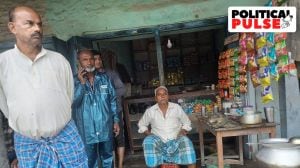Politicians keep jhuggis dark
NEW DELHI, March 31: On Tuesday, sub-inspector Jagdev Singh was only doing his duty: attempting to persuade the jhuggi dwellers of Alakna...

NEW DELHI, March 31: On Tuesday, sub-inspector Jagdev Singh was only doing his duty: attempting to persuade the jhuggi dwellers of Alaknanda to remove a road blockade. Then a stone struck him on the head. Today, he is in the ICU at AIIMS, with his skull fractured. The sub-inspector did not know then that the jhuggi dwellers were protesting because they wanted electricity — free of cost.
He also didn’t know that they were protesting Power Minister Narendra Nath’s moves to stop power thefts. Or that they were protesting against the sudden “non-interfering attitude” of local politicians.
“The jhuggi dwellers had got used to the Delhi Vidyut Board turning a blind eye to power thefts till recently. And the local politicians always ensured they had their way,” says a senior south Delhi police official. “But Jagdev Singh is probably not the last policemen to have been attacked in such circumstances.”
Ten days ago, a team of DVB officials had raided the colony and disconnected the power supply. The jhuggi dwellers were found tapping electricity from overhead wires. The DVB team told them that the electricity could be restored only if they got their connections regularised or joined the single-point scheme. The jhuggi dwellers refused.
They appealed to the local MLA and municipal councillors, hoping that the power supply would be restored “like it always was earlier”.
But this time the MLA and the councillors refused. The leaders are apparently supporting Narendra Nath’s single-point scheme as it also “suits their interests”. And never mind that it could mean alienating a big chunk of voters.
So, on Tuesday, 10 days after the colony plunged into darkness, the jhuggi dwellers ran riot. Sub-inspector Jagdev Singh and his three colleagues, who were also injured, were the unfortunate targets. Thirty people from the jhuggi colony, including seven women, have been arrested and booked under Section 308 of the Indian Penal Code (attempting to commit culpable homicide).
Says Narendra Nath: “Ten thousand jhuggi dwellers of Alaknanda cannot hold the government to ransom. We are determined to stop power thefts. If over one lakh jhuggi dwellers in other areas can join the single-point scheme, there is no reason why they can’t”.
Explaining the single-point scheme, he said each jhuggi cluster is being supplied electricity to one source. The pradhan, or a sub-licensee’, who is chosen by the government, or the local MLA, is then asked to take responsibility for distributing the electricity among the residents. The pradhan receives a 15 per cent commission on the total bill, which he is supposed to use for maintenance.
“But the most important thing is that an electric meter is installed only at the single-point. And whatever power is consumed by the residents is registered and billed on this meter,” says Narendra Nath.
This, he adds, covers two aspects: First, each and every consumer does not have to buy a meter or take responsibility for the equipment; if the meter is tampered with, the pradhan is held accountable. Secondly, it ensures that every consumer pays for the electricity he uses.



- 01
- 02
- 03
- 04
- 05




























